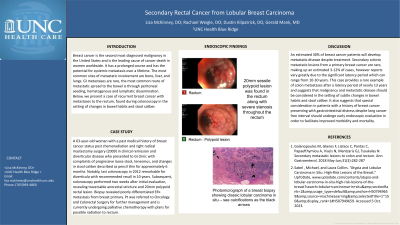Monday Poster Session
Category: Colon
P1733 - Secondary Rectal Cancer from Lobular Breast Carcinoma
Monday, October 23, 2023
10:30 AM - 4:15 PM PT
Location: Exhibit Hall

Has Audio
- LM
Lisa M. McKinney, DO
Blue Ridge Digestive Health
Morganton, North Carolina
Presenting Author(s)
Lisa M. McKinney, DO1, Rachael Weigle, DO2, Dustin Kilpatrick, DO2, Gerald Mank, MD2
1Blue Ridge Digestive Health, Morganton, NC; 2UNC Health Blue Ridge, Morganton, NC
Introduction: Breast cancer is the second most diagnosed malignancy in the United States and is the leading cause of cancer death in women worldwide. It has a prolonged course and has the potential for systemic metastasis over a lifetime. The most common sites of metastatic involvement are bone, liver, and lungs. GI metastases are rare, the most common route of metastatic spread to the bowel is through peritoneal seeding, hematogenous and lymphatic dissemination. Below, we present a case of recurrent breast cancer with metastases to the rectum, found during colonoscopy in the setting of changes in bowel habits and stool caliber.
Case Description/Methods: A 63-year-old woman with a past medical history of breast cancer status post chemoradiation and right radical mastectomy surgery (2009) in clinical remission and diverticular disease who presented to GI clinic with complaints of progressive loose stool, tenesmus, and changes in stool caliber described as pencil thin for approximately 6 months. Notably, last colonoscopy in 2012 remarkable for diverticula with recommended recall in 10 years. Subsequent, colonoscopy performed two weeks after initial evaluation, revealing traversable anorectal stricture and 20mm polypoid rectal lesion. Biopsy revealed poorly differentiated ER+ metastasis from breast primary. Pt was referred to Oncology and Colorectal Surgery for further management and is currently undergoing palliative chemotherapy with plans for possible radiation to rectum.
Discussion: An estimated 30% of breast cancer patients will develop metastatic disease despite treatment. Secondary colonic metastatic lesions from a primary breast cancer are rare, making up an estimated 3-12% of cases, however reports vary greatly due to the significant latency period which can range from 10-30 years. This case provides a rare example of colon metastases after a latency period of nearly 13 years and suggests that malignancy and metastatic disease should be considered in the setting of subtle changes in bowel habits and stool caliber. It also suggests that special consideration in patients with a history of breast cancer presenting with gastrointestinal distress despite long cancer free interval should undergo early endoscopic evaluation in order to facilitate improved morbidity and mortality.
Galanopoulos M, Gkeros F, Liatsos C, Pontas C, Papaefthymiou A, Viazis N, Mantzaris GJ, Tsoukalas N. Secondary metastatic lesions to colon and rectum. Ann Gastroenterol. 2018 May-Jun;31(3):282-287.
Disclosures:
Lisa M. McKinney, DO1, Rachael Weigle, DO2, Dustin Kilpatrick, DO2, Gerald Mank, MD2. P1733 - Secondary Rectal Cancer from Lobular Breast Carcinoma, ACG 2023 Annual Scientific Meeting Abstracts. Vancouver, BC, Canada: American College of Gastroenterology.
1Blue Ridge Digestive Health, Morganton, NC; 2UNC Health Blue Ridge, Morganton, NC
Introduction: Breast cancer is the second most diagnosed malignancy in the United States and is the leading cause of cancer death in women worldwide. It has a prolonged course and has the potential for systemic metastasis over a lifetime. The most common sites of metastatic involvement are bone, liver, and lungs. GI metastases are rare, the most common route of metastatic spread to the bowel is through peritoneal seeding, hematogenous and lymphatic dissemination. Below, we present a case of recurrent breast cancer with metastases to the rectum, found during colonoscopy in the setting of changes in bowel habits and stool caliber.
Case Description/Methods: A 63-year-old woman with a past medical history of breast cancer status post chemoradiation and right radical mastectomy surgery (2009) in clinical remission and diverticular disease who presented to GI clinic with complaints of progressive loose stool, tenesmus, and changes in stool caliber described as pencil thin for approximately 6 months. Notably, last colonoscopy in 2012 remarkable for diverticula with recommended recall in 10 years. Subsequent, colonoscopy performed two weeks after initial evaluation, revealing traversable anorectal stricture and 20mm polypoid rectal lesion. Biopsy revealed poorly differentiated ER+ metastasis from breast primary. Pt was referred to Oncology and Colorectal Surgery for further management and is currently undergoing palliative chemotherapy with plans for possible radiation to rectum.
Discussion: An estimated 30% of breast cancer patients will develop metastatic disease despite treatment. Secondary colonic metastatic lesions from a primary breast cancer are rare, making up an estimated 3-12% of cases, however reports vary greatly due to the significant latency period which can range from 10-30 years. This case provides a rare example of colon metastases after a latency period of nearly 13 years and suggests that malignancy and metastatic disease should be considered in the setting of subtle changes in bowel habits and stool caliber. It also suggests that special consideration in patients with a history of breast cancer presenting with gastrointestinal distress despite long cancer free interval should undergo early endoscopic evaluation in order to facilitate improved morbidity and mortality.
Galanopoulos M, Gkeros F, Liatsos C, Pontas C, Papaefthymiou A, Viazis N, Mantzaris GJ, Tsoukalas N. Secondary metastatic lesions to colon and rectum. Ann Gastroenterol. 2018 May-Jun;31(3):282-287.
Disclosures:
Lisa McKinney indicated no relevant financial relationships.
Rachael Weigle indicated no relevant financial relationships.
Dustin Kilpatrick indicated no relevant financial relationships.
Gerald Mank indicated no relevant financial relationships.
Lisa M. McKinney, DO1, Rachael Weigle, DO2, Dustin Kilpatrick, DO2, Gerald Mank, MD2. P1733 - Secondary Rectal Cancer from Lobular Breast Carcinoma, ACG 2023 Annual Scientific Meeting Abstracts. Vancouver, BC, Canada: American College of Gastroenterology.
